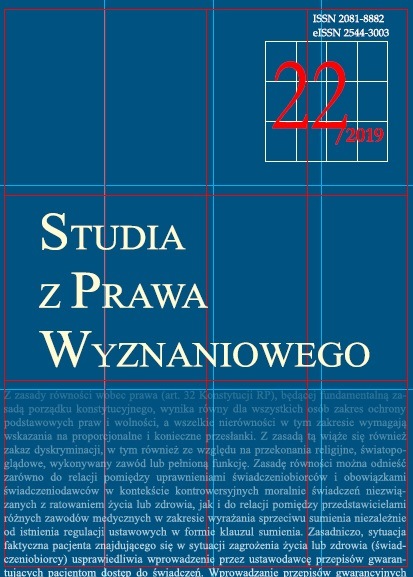Analiza projektu ustawy o zmianie ustawy o zawodach lekarza i lekarza dentysty, ustawy o diagnostyce laboratoryjnej oraz ustawy o zawodach pielęgniarki i położnej, zawartego w druku senackim nr 1034/IX kadencja (sprzeciw sumienia)
Analysis of the draft law amending the Act on the professions of physician and dentist, the Act on laboratory diagnostics and the Act on the professions of nurse and midwife, contained in the Senate Paper no. 1034/IX term of office
Author(s): Marcin OlszówkaSubject(s): Law, Constitution, Jurisprudence, Constitutional Law, Human Rights and Humanitarian Law
Published by: Katolicki Uniwersytet Lubelski Jana Pawła II - Wydział Prawa, Prawa Kanonicznego i Administracji
Keywords: conscientious objection; conscience clause; freedom of conscience; medical professions; supremacy of the constitution;sprzeciw sumienia; klauzula sumienia; wolność sumienia; zawody medyczne
Summary/Abstract: Conscientious objection is a refusal to fulfil the obligation that arises from the law due to one’s reasonably justified moral judgment that qualifies fulfilling this obligation as ethically wrong (objective evil). The right to conscientious objection, which is an integral element of freedom of conscience, is a constitutional right of every human being. As emphasised by the Constitutional Tribunal of the Republic of Poland in the judgment of 7 October 2015 (K 12/14): “the right to invoke the conscience clause and, as a result, the right to refuse to perform an act contrary to one’s conscience is the guarantee of freedom of conscience”. Regulating the use of the right to conscientious objection, that is, establishing the so-called conscience clause, is the responsibility of the ordinary legislator.The draft legislation amending the Act on the professions of physician and dentist, the Act on laboratory diagnostics and the Act on the professions of nurse and midwife, adopted by the Human Rights, the Rule of Law and Petitions Committee of the Senate of the Republic of Poland, was supposed to regulate the conscience clause in medical professions, realise the petition to revoke art. 3 para. 2 of the Act of 17 May 1989 on guarantees of freedom of conscience and religion, which generally prohibits the invocation of conscientious objection, and implement the above-cited judgment of the Tribunal in a comprehensive way.Although this initiative deserves approval, the current text of the draft law proves that the judgment of the Tribunal will be implemented only to a limited extent. It ignores the request made in the petition and lowers the statutory standard of protection of the right to conscientious objection.First of all, it is questionable that healthcare entities (e.g., manager of hospitals) would be obliged to indicate real possibilities of obtaining a service refused by a physician or nurse (midwife), and, in the case of a laboratory diagnostician, to perform a service. This is contrary to freedom of conscience, which means, as noted by the Constitutional Tribunal, protection from conduct “which indirectly leads to an unacceptable ethical effect, [and] in particular [protection] from coercion to cooperate in achieving an immoral goal” (e.g., from the obligation to inform a patient who can perform an abortion and where it can be performed). At the same time, the draft law questions the so-called institutional conscience clause, which the Parliamentary Assembly of the Council of Europe requested to respect in Resolution no. 1763 of 7 October 2010.
Journal: Studia z Prawa Wyznaniowego
- Issue Year: 2019
- Issue No: 22
- Page Range: 349-377
- Page Count: 29
- Language: Polish

